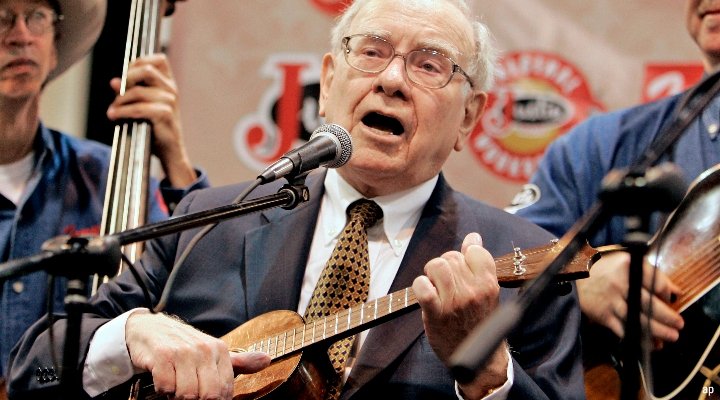Warren Buffettin vetämä Berkshire Hathaway kysyi omistajiltaan, pitäisikö sen ryhtyä vähentämään valtavaa käteisvuortaan maksamalla osinkoja. Peräti 97 prosenttia omistajista vastasi: ei. He haluavat mieluummin, että Warren Buffett joukkoineen sijoittaa rahat eteenpäin kuin yrittävät sitä itse.
Tällä videolla analyytikkomme Matt Coffina vetää yhteen Berkshiren tilannetta.
Jeremy Glaser: For Morningstar, I'm Jeremy Glaser, the Berkshire Annual Meeting just wrapped up, and I'm here with Matt Coffina to talk about the second half.
Matt, thanks for joining me.
Matt Coffina: Thanks for having me, Jeremy.
Glaser: Let's talk about Berkshire's cash position first. There was a question about if 20 years from now Berkshire's market cap is 2 or 3 times what it is today, how would the company look different? And Buffett said they might have more cash they intelligently know what to do with. What do you make of this? Does that give you any signs about what the future of the company could be?
Coffina: It's a question that comes up again and again for Berkshire is when and if they'll ever pay a dividend and why they have so much cash on the balance sheet. Are they still able to deploy that cash in an effective way? Somebody pointed out that if Berkshire's intrinsic value doubles over the next 10 years and then doubles over the 10 years after that, that they'll have $1.2 trillion market cap, assuming they don't do repurchases or dividends.
And Buffett seemed very clear that at some point, they're not going to be able to intelligently use all of the cash that they're generating; that's just in the nature of the business. They're trying to generate more and more cash over time. And at some point it's just not going to make sense to try to invest that themselves, and they will pay a dividend.
But Buffett was very clear also in saying that he doesn't expect that time to be anytime soon. In fact, they did a shareholder proposal recently to consider implementing a meaningful dividend and 97% of shareholders--and I was certainly surprised by how high that number was, I think, Buffett was surprised too--but 97% of shareholders opposed implementing a dividend right now versus following the company's current course, which is Buffett trying to reallocate that capital himself.
Glaser: Intrinsic value is a concept that's important to Morningstar, but also important to Warren Buffett. And he described a little bit about how he thinks about it. Did you learn anything there?
Coffina: Yeah, I think intrinsic value is a very hard concept to get your mind around. It's very important. It's what really matters the most in investing, but it's something that you can't even estimate with precision, even if you're the CEO of the company.
So Buffett gave the example that he and Charlie Munger, if they came up with independent estimates of Berkshire's intrinsic value, he thinks they'd probably be within the 5 percentage points of each other, but they wouldn't be within 1 percentage point. So it's a very uncertain concept, but very important. Again, basically intrinsic value is the discounted present value of all future cash flows from now until the end of time, as Buffett would say.
So that's a very uncertain thing: What are cash flows going to be 10 and 20 and 30 years from now? And we can have a decent sense over the next year, and the further out in time you go, the harder it gets. But I think the thing that investors need to focus on is whether Berkshire is continuing to compound its intrinsic value over time, and maybe the best way to track it is growth in book value per share, which has grown about 10% a year on average over the last decade. I expect similar growth going forward, and I think they're intrinsic value is likely to grow at more or less the same pace of 10% a year or so as they reinvesting capital.
They're reinvesting both internally, so when they're investing in the utilities, in the railroads, you could expect that they're earning maybe a 10% kind of return, and then if they're using the cash for external investments you hope that they're getting at least that kind of return, as well.
Glaser: Andrew RossSorkin asked a question relating to activist investors, Buffett's and Munger's views on these hedge fund managers that are very activists. Were you surprised that Warren and Charlie were so hesitant to support it or were so resistant to it?
Coffina: Well, I think they're very clear in saying that they think that activists investors are bad for America. They think that it's a terrible trend that these activists are getting so much say in corporate decision-making. They also said that anything on Wall Street that seems to be working in the short-term is going to attract money. It's going to attract fund flows, until it stops working basically. Basically implying that right now these activists strategies seem to be successful, but over the long run they're probably not going to create real intrinsic value for investors.
So they were very clear in saying that they don't approve of the current wave of activism that we're seeing and that they wish that it would go away.
Glaser: How do you reconcile that answer with the one that came a little bit later about the Brazilian partners, 3G Capital, and they spoke very highly of [3G's] ability to come in and kind of do some activism and turn around businesses they bought? How do those two things live together?
Coffina: It definitely creates a little bit of cognitive dissonance that they're so supportive of 3G Capital and their strategy, which for example the Heinz deal involved 3G coming in, taking over management, cutting a lot of the cost structure they viewed as bloated, and Charlie and Warren Buffett both found that strategy to be illuminating.
They found there were a lot of costs to be cut in Heinz and that it is to the long-term benefit of the company. They said you definitely want to be sensitive about how you're going about it. People are often losing their jobs and so on as you're cutting these costs. They think it is healthy for the company and for the economy over the long run.
I think the difference probably is that these people are more intimately involved with the business. They own the whole company; they're not just agitating from the outside and just going to cut and run as soon as whatever change they're looking for is made. Often these activists want a big share repurchase or something like that. But six months later they're out of the stock; they're not involved any more.
3G is really investing for the long-run health of the business, and Buffett is investing right alongside them. I think Buffett and Munger are finding that there are lessons to be learned from the way that 3G is managing Heinz, for some of their other businesses as well, where there may be some fat inside of those businesses that could be trimmed.
Glaser: Matt, I appreciate your thoughts today.
Coffina: Thanks for having me, Jeremy.






















